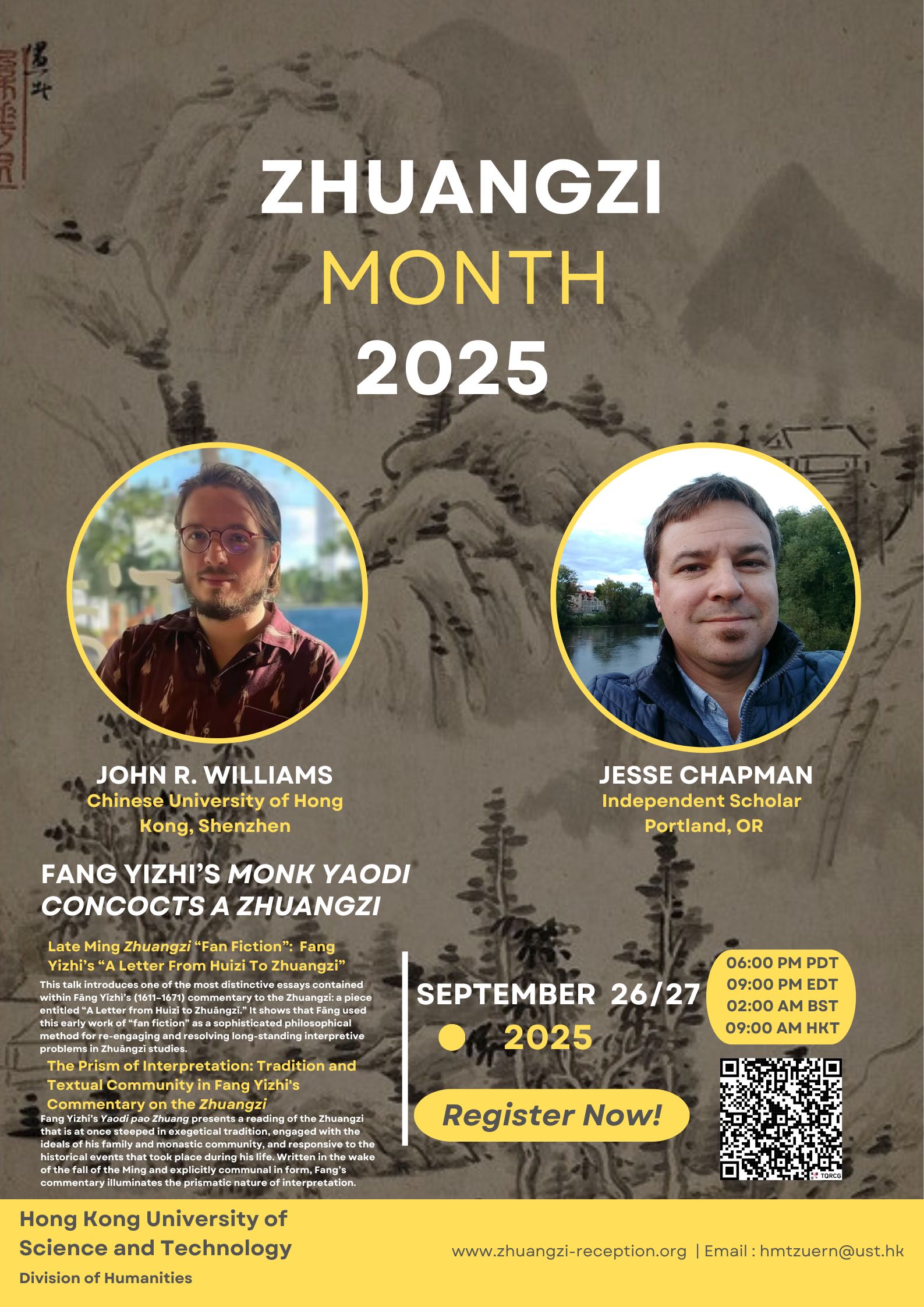Late Ming Zhuangzi "Fan Fiction": Fang Yizhi's "A Letter From Huizi To Zhuangzi"
Abstract:
Fāng Yĭzhì’s (方以智, 1611-1671) Yàodì Páo Zhuāng 藥地炮莊(ca. 1663, Monk Yàodì Concocts* a Zhuāngzĭ) is an exceptionally complex text. The present talk introduces one of the most distinctive essays contained within Yàodì Páo Zhuāng, an early work of “fan fiction” entitled Huìzĭ yŭ Zhuāngzĭ shū 惠子與莊子書 (“A Letter from Huìzĭ to Zhuāngzĭ”), in which Huìzĭ writes to Zhuāngzĭ from beyond the grave to complain about how he is depicted in the Zhuāngzĭ, among other concerns. This work of “fan fiction”, modeled on Zhāng Zìliè’s (張自然; 1597-1673) Yŭ gŭrén shū 與古人書 “Letters to the Ancients”, is known as one of the Lúshān èr shū 廬山二書 “Two Writings from Lúshān” finished in 1652. The other of these “two writings”, which shall be discussed en passant, is the complex Xiàng Zĭqī yŭ Guō Zĭxuán shū 向子期與郭子玄書 (“A Letter from Xiàng Zĭqī [Xiàng Xiù (向秀; ca. 227-272)] to Guō Zĭxuán [i.e., Guō Xiàng (郭象; ca. 252-312)]”). This talk will argue that Fāng Yĭzhì’s use of this “fan fiction” format is not merely a literary novelty, but a sophisticated philosophical method for re-engaging and resolving long-standing interpretive problems in Zhuāngzĭ studies.
Biography:
John R. Williams is interested in the history of Chinese philosophy, especially the traditional reception of the Zhuangzi. He currently teaches at the Chinese University of Hong Kong, Shenzhen, where he received support under Shenzhen’s Peacock Talent Program. He obtained his Ph.D. from the Department of Philosophy at National University of Singapore, where he was awarded the President’s Graduate Fellowship. His background also includes prolonged studies at the International Chinese Language Program at National Taiwan University.
========================================================================================
“The Prism of Interpretation: Tradition and Textual Community in Fang Yizhi's Commentary on the Zhuangzi”
Abstract:
Interpretation is an act that involves not only the relationship between a text and an interpreter, both a host of factors that mediate that relationship— including received readings of the text, contemporary events, and the communities in which the interpreter is a member. Fang Yizhi’s Yaodi pao Zhuang presents a reading of the Zhuangzi that is at once steeped in exegetical tradition, engaged with the ideals of his family and monastic community, and responsive to the historical events that took place during his life. Written in the wake of the fall of the Ming and explicitly communal in form, Fang’s commentary illuminates the prismatic nature of interpretation.
Biography:
Jesse Chapman earned a PhD in Chinese Language from the University of California, Berkeley in 2015, and he has since served as a postdoctoral fellow in Chinese Studies at the Center for East Asian Studies at Stanford University and taught courses at the University of Oklahoma-Norman, the University of California-Merced, NYU, UCLA, and Portland State University. His scholarly interests center on exegesis, the interpretation of signs, and the relationship between technical texts and historical and literary writing. His publications include a monograph, titled Celestial Signs and Classical Rhetoric in Early Imperial China (SUNY Press 2025), as well as several articles and book chapters like “Unwholesome Bodies: Reading the Sign of the Amputated Foot in Early China” (Asia Major, 2017), “Lao-Zhuang in the Vernacular: Two Evolutionary Readings,” (Journal of Modern Chinese History, 2017), and “Celestial Signs in Three Historical Treatises” (in Technical Arts in the Han Histories, SUNY, 2021).
www.zhuangzi-reception.org
06:00 PM PDT
09:00 PM EDT
02:00 AM BST
09:00 AM HKT
Email: hmtzuern@ust.hk
